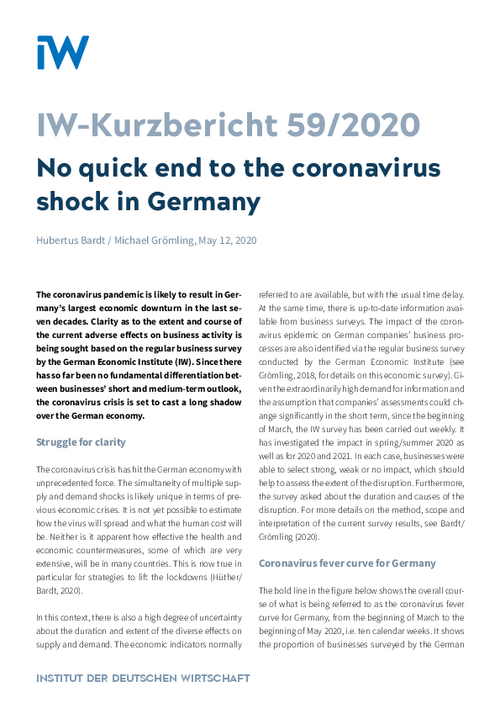The coronavirus pandemic is likely to result in Germany’s largest economic downturn in the last seven decades. Clarity as to the extent and course of the current adverse effects on business activity is being sought based on the regular business survey by the German Economic Institute (IW). Since there has so far been no fundamental differentiation between businesses’ short and medium-term outlook, the coronavirus crisis is set to cast a long shadow over the German economy.

No Quick End to the Coronavirus Shock in Germany

The coronavirus pandemic is likely to result in Germany’s largest economic downturn in the last seven decades. Clarity as to the extent and course of the current adverse effects on business activity is being sought based on the regular business survey by the German Economic Institute (IW). Since there has so far been no fundamental differentiation between businesses’ short and medium-term outlook, the coronavirus crisis is set to cast a long shadow over the German economy.
Struggle for clarity
The coronavirus crisis has hit the German economy with unprecedented force. The simultaneity of multiple supply and demand shocks is likely unique in terms of previous economic crises. It is not yet possible to estimate how the virus will spread and what the human cost will be. Neither is it apparent how effective the health and economic countermeasures, some of which are very extensive, will be in many countries. This is now true in particular for strategies to lift the lockdowns (Hüther/Bardt, 2020).
In this context, there is also a high degree of uncertainty about the duration and extent of the diverse effects on supply and demand. The economic indicators normally referred to are available, but with the usual time delay. At the same time, there is up-to-date information available from business surveys. The impact of the coronavirus epidemic on German companies’ business processes are also identified via the regular business survey conducted by the German Economic Institute (see Grömling, 2018, for details on this economic survey). Given the extraordinarily high demand for information and the assumption that companies’ assessments could change significantly in the short term, since the beginning of March, the IW survey has been carried out weekly. It has investigated the impact in spring/summer 2020 as well as for 2020 and 2021. In each case, businesses were able to select strong, weak or no impact, which should help to assess the extent of the disruption. Furthermore, the survey asked about the duration and causes of the disruption. For more details on the method, scope and interpretation of the current survey results, see Bardt/Grömling (2020).
Coronavirus fever curve for Germany
The bold line in the figure below shows the overall course of what is being referred to as the coronavirus fever curve for Germany, from the beginning of March to the beginning of May 2020, i.e. ten calendar weeks. It shows the proportion of businesses surveyed by the German Economic Institute which expect the coronavirus pandemic to have a strong impact on their business processes in spring/summer 2020.

No Quick End to the Coronavirus Shock in Germany

More on the topic

Determinants of personnel planning in Germany
The German labor market has been growing since 2005. The dip in the wake of the coronavirus pandemic between 2020 and 2022 is an exception, as the German labor market has reached a record level of 45.9 million people in employment by 2023.
IW
Effects of the Middle East conflict on the German economy
Beyond the humanitarian crisis associated with the geopolitical conflict in Israel, which affects millions of human lives, the Middle East conflict also leaves lasting marks on economic activity not only in the affected region, but also in Germany and the ...
IW